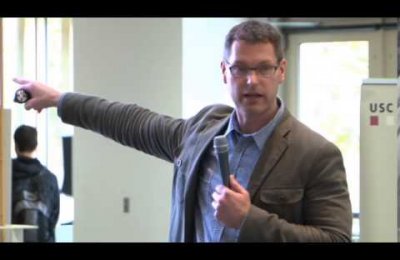Norman Lewis Corwin, one of USC Annenberg’s most beloved professors – and one of the country’s greatest radio dramatists – died Tuesday. He was 101.
He was a Bostonian who, at 17, started on a course that led him ultimately into almost all forms of media. After 10 years as a newspaperman, he moved into radio and served as writer-director-producer for CBS in the heyday of that network's glory with such memorable series as "26 by Corwin," "Columbia Presents Corwin," and such milestones in broadcasting as the four-network "We Hold These Truths."
Corwin’s landmark radio drama, “On a Note of Triumph,” an hour-long poetic meditation on World War II, was hailed by Carl Sandburg as “a vast announcement, a terrific interrogatory, one of the all-time great American poems,” while Billboard declared it “the single greatest—and we use ‘greatest’ in its full meaning—radio program we ever heard.”
He wrote and directed stage plays, television dramas, motion pictures, three cantatas (one of which was performed in the Assembly Hall of the United Nations), and even the libretto of an award-winning one-act opera that was produced by the Metropolitan. He wrote the Oscar-nominated screenplay for "Lust for Life," for which Anthony Quinn won an Oscar for his performance as Gauguin.
Among recent works, Corwin wrote the culminating Ode to wrap up CBS' nine-hour 50th-anniversary celebration. He was the author of 12 published books and led two award committees for the Academy of Motion Picture Arts & Sciences.
Until the end of his life, Corwin was a Writer in Residence at USC Annenberg. USC Annenberg Dean Ernest J. Wilson III called Corwin “a true legend.” “His insightful, inspiring body of work has been absorbed into the American consciousness. He gave us the benefit of his knowledge, wit and keen observations through many decades, and he was a literary treasure.”
Over more than three decades, Corwin passed down to his students the values of integrity, empathy and excellence, Wilson said. “And even as the profession of journalism evolved, his contributions remained powerful and influential. USC Annenberg will proudly carry Norman’s legacy into the future.”
Geneva Overholser, director of USC Annenberg's School of Journalism, called Corwin "a legend in our midst -- a legend whose warm, funny, wise and flirtatious spirit transcended eminence and age.
"He had experienced so much, but his hunger to know and feel more never dulled. He was a phenomenon the likes of whom we won't see again," she said.
Corwin joined USC Annenberg in 1979 at the urging of Professor Joe Saltzman, who had created a broadcast program and needed to add radio to the curriculum.
“When it came to radio, there was only one man in America I wanted to bring to USC and that was Norman Corwin,” Saltzman said. “We met over lunch and an hour later he became a member of our adjunct faculty and taught at USC for the next three decades. I used to sneak into his class just to listen to his lectures.”
“Norman Corwin was the most articulate person I have ever met,” Saltzman said. “He used language in a way so unique, so eloquent, so funny, so precise that it was just a pleasure to sit with him and listen to him talk about anything and everything, especially the people he knew from the famous to the infamous to the people he met on a daily basis.”
Bryce Nelson, a fellow journalism professor at USC Annenberg, called Corwin "a great person, a great artist with words, a great teaching colleague and a great friend.
"I think a student that Norman and I had said it best," Nelson continued. "His name was Joshua Talley, and he said, 'He made me believe in myself. Norman found a reason for every student to believe in himself and then provided criticism to make us even better.'"
University Professor Geoffrey Cowan, who preceded Wilson as USC Annenberg dean, said Corwin was "truly remarkable, and we all thought he would live forever. We -- and our students -- were so lucky to have had him at USC."
At a 100th birthday celebration thrown for Corwin at USC Annenberg last year, Wilson quoted Corwin from an oral history he had shared with Annenberg professor Bryce Nelson on his 95th birthday. Corwin had said:
“My approach is distinct from that of searching only for what’s wrong. I lay heavy emphasis on what is right because that too often escapes the awareness of a writer….I also place emphasis on rewriting, on the theory that all first drafts are trash. And that applies to my own first drafts. I think it’s terribly important to read, to watch television and movies, and listen to radio, to read books, magazines, newspapers, even when the material is poor. A student should learn what makes it poor.
“In sum, I urge my students to read widely. I believe in the benefits of intellectual osmosis.”
More info
Corwin's 100th Birthday Celebration
Slideshow: Norman Corwin








